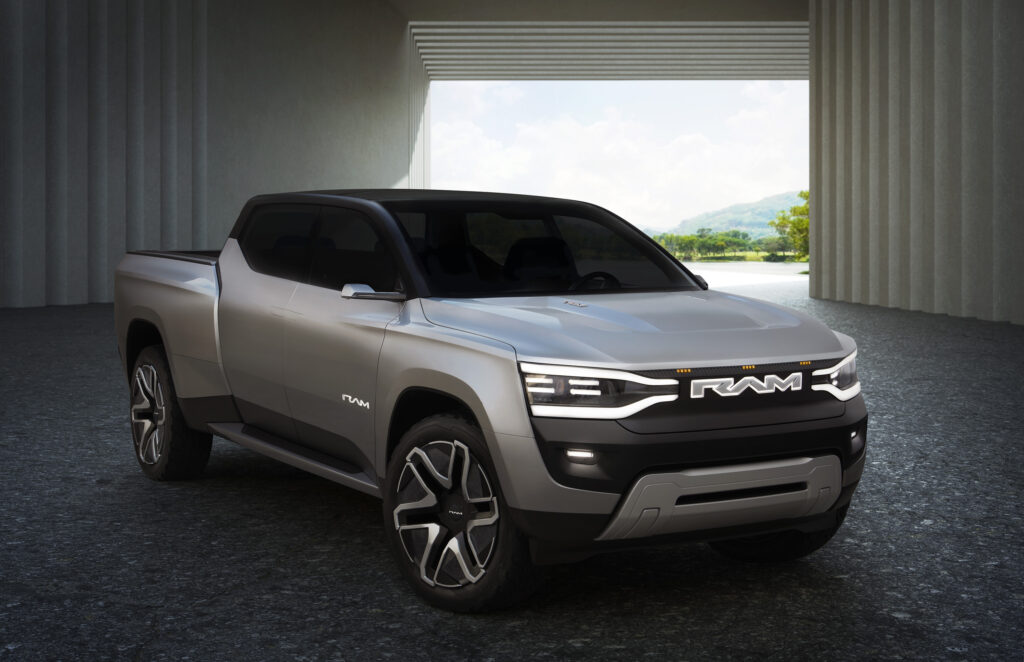Ram’s Revolution BEV (battery-electric vehicle) Concept is more than a design exercise — it represents a serious look at how Ram plans to bring its full-size pickup DNA into the electric era. First revealed at CES 2023, the concept blends rugged functionality, bold styling, and advanced EV technology. Stellantis Media+2PR Newswire+2
Design: “Brutiful” Strength Meets Innovation
The exterior design has been described by Ram as “brutiful” — both brutal and beautiful. PR Newswire+1
A modern, animated “R-A-M” badge highlights the front fascia, featuring a fully animated LED “tuning fork” design. PR Newswire
The concept’s doors open in a grand saloon style (no B-pillar), creating an open, spacious feel for the cabin. PR Newswire
Lighting is a major design element: fully animated LED taillamps and LED badging emphasize Ram’s design ambition. Stellantis Media
Powerful & Functional EV Architecture
The Revolution concept runs on Ram’s STLA Frame architecture — a body-on-frame EV platform designed specifically for large vehicles. Stellantis.com
It’s powered by two electric drive modules (EDMs) — one at the front and one at the rear — giving it all-wheel-drive capability. Stellantis.com
For charging, the concept supports 800-volt DC fast charging: Ram claims it can add 100 miles of range in about 10 minutes. Stellantis.com
The concept also uses an adjustable air suspension with three modes: ingress/egress, aero, and off-road. SEMA
To improve maneuverability, Ram equipped the concept with four-wheel steering (up to 15° of articulation). Stellantis.com
A Flexible, High-Tech Interior
Inside, the Revolution concept is called a “one-space environment.” The cabin is radically reimagined with a continuous space from front to back and flexible seat configurations. Stellantis Media+1
Ram Track — a rail-attachment/floor-track system — runs through the seats, console, frunk, and bed. It allows modular storage and tie-down points. GreenCars
There’s a powered mid-gate with jump seats: the lower portion of these seats is removable and can be placed in the bed or outside the truck. MOTOR+1
The concept also offers third-row jump seats, a rare feature for a pickup, enabled by the concept’s long cabin. Stellantis.com
A large digital display system is at the core of the interior: two screens provide up to 28 inches of combined screen space. The lower screen is removable and can be repositioned. MOTOR
Smart & Sustainable Materials
The concept uses sustainable materials throughout: for example, Ram uses vegan “apple leather” (made from apple-industry byproducts) for seating surfaces. GreenCars
The interior flooring also incorporates recycled rubber and cork, giving the cabin a modern yet eco-conscious feel. GreenCars
Next-Level Features & Innovation
An AI-powered virtual assistant — represented as a 3D Ram avatar — offers voice control, both inside and outside the vehicle. Stellantis Media
“Shadow Mode” is one of the most futuristic features: by voice command, the truck can “follow” the owner walking ahead, navigating around obstacles. Stellantis Media
The concept features an inductive “Ram Charger”: a robotized home charger that aligns under the vehicle, moves into position automatically, and supports smart charging. SEMA
Why It Matters
The Revolution concept gives a clear signal that Ram is serious about electrification for its full-size trucks — it’s not just a styling exercise.
By building on the STLA Frame platform, Ram shows it’s planning EVs with scale, expected performance, and off-road capability.
The flexible interior design (with rail systems and modular seating) could dramatically reshape how people use their trucks: for work, leisure, or both.
The smart charging and AI-driven features point to Ram’s broader vision of a more connected, intelligent, and future-ready truck.
Bottom line: The Ram 1500 Revolution BEV Concept is a bold exploration of what an electric Ram pickup could look and feel like — combining performance, sustainability, and modular practicality. While it’s still a concept, many of its ideas feel very production-relevant — particularly for future EV trucks that don’t just tow, but live in the lifestyle of their owners.

